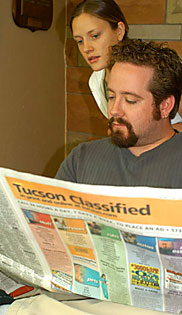 |
|
EMILY REID/Arizona Daily Wildcat
|
With school finally behind them, graduating seniors Daniel Rhodes, history, and Emilia Swetnam, media arts, look over possible job opportunities.
|
|
By Bob Purvis
Arizona Daily Wildcat
Wednesday May 14, 2003
Challenges still exist, poll says
Working women still feel the weight of the glass ceiling, according to a recent nationwide survey.
In an online poll conducted by CareerWomen.com last month, more than 96 percent of women polled said they believed corporate culture continues to favor men.
The majority of those surveyed said they are excluded from formal networks and hindered by stereotypes and preconceptions about a woman's capabilities in the workplace.
More than half thought that male management perceived women's family responsibilities would interfere with their work.
"Women are still facing challenges when it comes to career opportunities and advancement," said Jillian Donnelly of CareerWomen.com. "The responses and comment from this poll make it very clear that women have to look very hard for advancement opportunities and make it a priority."
Diane Perreira, chair of UA's Commission on the Status of Women, said the poll is evidence of the continuing inequity female graduates can expect to confront in the workplace.
"Of course progress is being made," Perreira said. "But we're still lagging behind."
Perreira said that although women are becoming increasingly more integrated into corporate America, they can still expect to be paid substantially less than their male counterparts.
In 2000, on average, women earned about 82 percent of what their male counterpart made, according to the Bureau of Labor Statistics (BLS).
That's almost 20 percent more than what women made about 25 years ago.
"There is reason for women to believe that there is still a lot to overcome," Perreira said. "Just because you're the top academic achiever doesn't mean you can expect equity in the corporate structure."
Planetary science graduate student Rachel Mastrapa said that, although she has never run into any outright sexism while working in the department of planetary sciences, she is still discouraged by the lack of women advancing in her field.
"There are more women undergraduates in male-dominated studies, but there aren't more women faculty, " Mastrapa said. "I wonder what exactly I am going to do to become faculty."
However, according to the BLS, women held 51 percent of "total employment in executive, administrative, and managerial occupations" in 2000.
Mastrapa said she has been aided by her participation in women's professional groups on campus. She has been a member of the Association of Women in Science and Women in Science and Engineering.
Perreira offered a list of steps women can take to help overcome the barriers of discrimination they might face along the way:
· Establish networks with other female professionals.
· Seek mentoring from other successful women.
· Look for every available mode of advancing your career.
· Listen to women who have succeeded and emulate them.
Perreira said that methods like these have allowed women to empower themselves and take advantage of their ability to work as a group.
"Women have learned to draw significant amounts of support from one another," Perreira said.
Mastrapa said being a part of a group of professional women provides a forum that helps women discuss problems and solutions in their careers.
"Most of what the women's groups do is get together and talk about problems they are coming up against in their career," Mastrapa said.
The survey's complete findings, as well as other career strategies and employment listings, can be found at www.CareerWomen.com.

